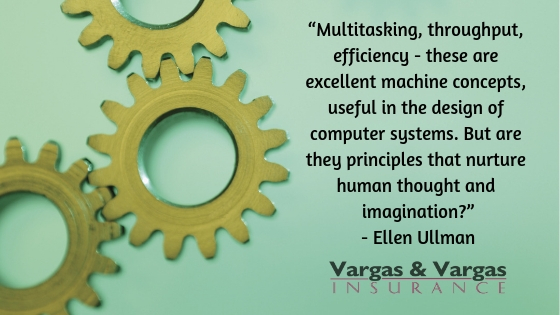Happy Monday once again, friends!
Have you been looking forward to my positive words of wisdom for the week?

As I mentioned last week, the term “multitasking” was originally used to describe how microprocessors in computers work. Machines multitask, but people cannot.
Many people believe they are excellent multi-taskers, despite the challenges of performing two tasks at once. Think of the many times when you do several things at once, like talking on the phone while cooking. Did you ever burn the soup? Or maybe the soup is fine, but the person on the other end of the phone conversation says, “Hey! Are you listening to me?”
Consider the amount of attention that each of these simple tasks requires. One, or both, may be simple enough to be carried out on autopilot. Or, not.
While we may be okay performing simple tasks simultaneously, what about more complex tasks? Can you give full attention to your PowerPoint presentation while watching your favorite movie? Watching it while you work is fun, but maybe you’re making your work more difficult and time-consuming. How many times did you revise that PowerPoint slide while giggling at a favorite line in your favorite movie? I’ll bet it happens often.
Your brain was designed to focus on one thing at a time, not many things.
Your brain compensates when you ask it to latch onto multiple targets, switching back and forth, back and forth. You focus on the more urgent task; the other task slides into the background. Your brain realizes you’ve been neglecting that task, and, switches again. And again.
When you’re bouncing back and forth like this, an area of the brain known as Brodmann’s Area 10 activates. Located in your frontopolar prefrontal cortex at the very front of the brain, Brodmann’s Area 10 controls your ability to shift focus from one task to another. People who think they are excellent multi-taskers are really just putting their Brodmann’s Area 10 to work.
I know you’re reading my message, thinking, “But I can juggle multiple tasks!” Tune in for my next message to see why that may not be true.
Carlos













